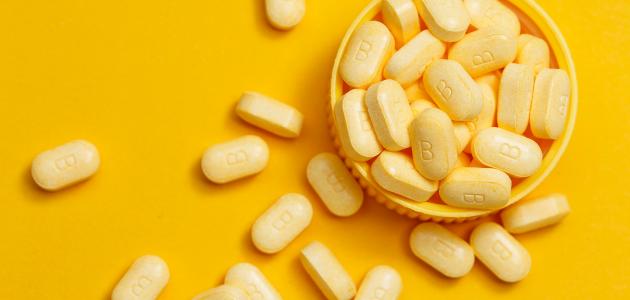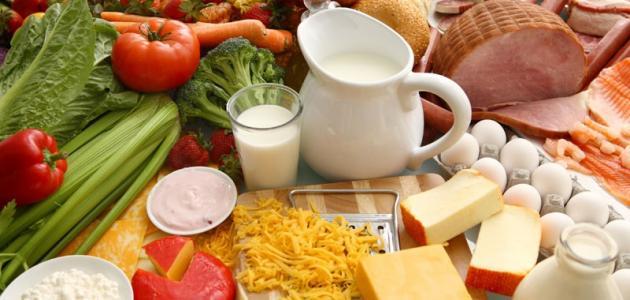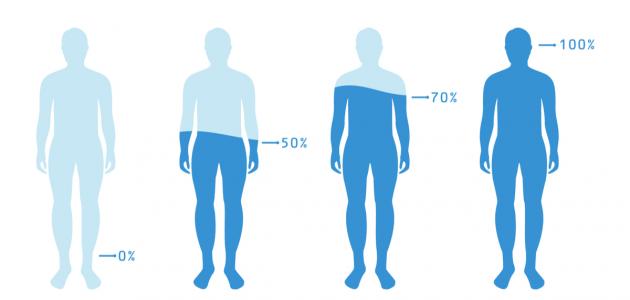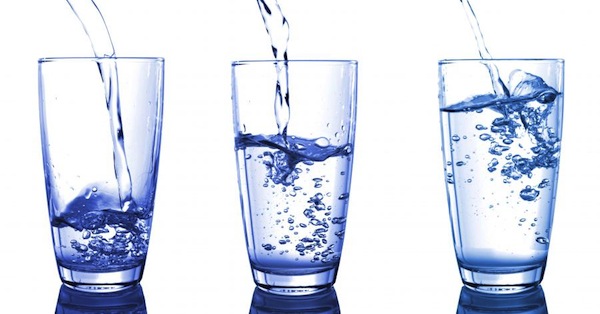Contents
Vitamin B.
The group of B vitamins consists of eight types, which are vitamin B1 (thiamin), vitamin B2 (riboflavin), vitamin B3 (niacin), vitamin B5 (pantothenic acid), vitamin B6 (pyridoxine), vitamin B7 (biotin), and vitamin B9 ( acid Folate ), and vitamin B12 (cobalamin), [1] These vitamins are found naturally in many foods, and they are considered water-soluble vitamins, so the body's ability to store them is limited with the exception of vitamin B12And folate, which are stored in the liver, and therefore, those who suffer from malnutrition for several months may suffer from a deficiency in B vitamins, and therefore it is necessary to pay attention to a healthy, balanced diet that contains all the nutrients, including B vitamins, and it is worth noting that the B vitamins are easy to break down. During the cooking process, the body needs it in small quantities to perform some functions such as producing energy and contributing to the formation of red blood cells. [2]
Vitamin B benefits and functions
Vitamins of group B contribute to many vital functions of the human body; As it plays an important role in reducing the risk of infection, maintaining cell health, promoting the growth and health of red blood cells, regulating energy levels and the production of hormones and cholesterol in the body, enhancing vision safety, brain and nerve functions, cardiovascular health, digestion, and appetite regulation, And muscle strength, as these vitamins are especially important for pregnant and breastfeeding women, as they help the child's brain development, reduce the child's risk of birth defects, increase energy levels, alleviate symptoms of nausea, and reduce the mother's risk of preeclampsia., and although there are no human studies to confirm the importance and benefits of B vitamins for men, it is believed that they have a role in raising their testosterone levels. Its levels naturally decrease as the man gets older, and it may also contribute to building muscle and increasing body strength. [3] We mention the following, the function of each type of B vitamins separately:
Vitamin B1
The vitamin B 1 or the so - called Balthiaman of important vitamins for the human body, it is accompanied by enzymes and helps to convert carbohydrates into sugar, has been named vitamin B1 because it is the first vitamin was discovered among a group B vitamins, and deficiency causes a disease called beriberi , and among its functions: [4]
- It is essential for a healthy heart.
- It is involved in carbohydrate metabolism and energy production.
- It contributes to the development and functions of the nervous system .
- It enhances the body's immunity, and maintains the strength of vision.
- It improves kidney function and slows the progression of kidney disease for people with diabetes.
- It plays a role in muscle contraction and the conduction of nerve signals. [5]
- It is effective in treating vitamin B1 deficiency, improving metabolic disorders, and reducing the risk of developing Wernicke-Korsakoff syndrome. [6]
- For more information about the benefits of thiamine, read the Vitamin B1 Benefits article .
Vitamin B2
The body needs to consume vitamin B2 or Riboflavin on a daily basis, because the body can only store small amounts of it, and among the most important functions of vitamin B2 we mention the following: [7]
- It contributes to maintaining the mucus membranes in the digestive system.
- Contributes to maintaining the health of the liver .
- It is involved in the conversion of the amino acid tryptophan to niacin.
- It helps absorb and activate iron and some other B vitamins, such as B1, B3, B6 and B9.
- It is important for healthy skin and eyesight. [8]
- Riboflavin deficiency is effective in reducing the risk of developing vitamin B2 deficiency. [9]
- For more information about the benefits of vitamin B2, you can read the article on the benefits of vitamin B2 .
Vitamin B3
Vitamin B3 or niacin is one of the vitamins that are soluble in water, and it is worth noting that it is rare for a person to have a deficiency in it, and among the functions of niacin in the human body we mention the following: [10]
- Converting food into energy so that the body can benefit from it.
- Contribute to improving cholesterol levels, by raising the levels of good cholesterol and reducing levels of harmful cholesterol.
- Lowering triglyceride levels.
- Often effective in reducing levels of abnormal fats in the blood, the US Food and Drug Administration has approved some products that contain niacin for use in improving cholesterol levels. [11]
- Often effective in treating vitamin B3 deficiency, and preventing it, or from developing any condition associated with its deficiency. Like pellagra. [11]
Vitamin B5
Vitamin B5 is known as pantothenic acid, and it is rare to have a deficiency, but this may cause some symptoms such as headache, fatigue, irritability, and digestive disorders, and its sources include sweet and white potatoes, broccoli, eggs , and others. Among the functions of vitamin B5: [12]
- Maintain healthy skin , hair and eyes.
- Contribute to the functions of the nervous system and the liver.
- Maintaining the health of the digestive system.
- The production of red blood cells that carry oxygen to the cells of the body.
- Effective in alleviating Pantothenic acid deficiency; And reduce the risk of infection. [13]
- For more information about the benefits of vitamin B5, read the article What are the benefits of vitamin B5 .
Vitamin B6
The vitamin B - 6 , or the so - called Balbaradoudi of soluble vitamins in the water, so the body does not store it , and get rid of any excess amount of it through the urine, and therefore the human needs to be addressed on a daily basis, it is worth mentioning that most of People who eat a balanced diet do not develop a deficiency in vitamin B6, but the lack of protein consumption causes this deficiency, as proteins - such as chickpeas and meat - are among the most important sources of it, in addition to bananas, nuts, whole grains and other things, and from the functions of vitamin B6: [14]
- Converting food in the body into energy.
- Maintaining the healthy functions of the brain and nervous system.
- Contribute to the production of hemoglobin, which is the protein responsible for transporting oxygen to the cells of the body.
- Helping the production of certain hormones, such as serotonin and norepinephrine.
- Helping to produce melatonin, which regulates sleep and the human internal clock.
- Effective in alleviating epilepsy, improving sideroblastic anemia, and treating vitamin B6 deficiency. [15]
- For more information about the benefits of vitamin B6, read the article on the benefits of vitamin B6 .
Vitamin B7
Vitamin B7 or Biotin is one of the water-soluble vitamins, and it accompanies the enzymes (coenzyme) in the metabolism of fatty acids, leucine, and many other nutrients, and it is rare for a person to develop a vitamin deficiency. B7, except that it may cause hair loss, cracks on the sides of the mouth, dry eyes, and lack of appetite, and its sources include: liver meat, egg yolks, mushrooms , avocados, and others. Among the functions of vitamin B7: [16]
- Contribute to the metabolism of nutrients in the body.
- Maintain healthy skin, hair and mucous membranes.
- Maintaining the functions of the nervous system.
- Often effective in reducing or treating biotin deficiency. [17]
- For more information about the benefits of vitamin B7, read the article on the benefits of vitamin B7 .
Vitamin B9
Vitamin B9, or folic acid, is a water-soluble vitamin, and its deficiency in a pregnant mother may increase the risk of having a child with birth defects, so mothers should start taking acid supplements. Folate at least one year before pregnancy, and sources of folate are broccoli, lentils , egg yolks, lettuce, liver meat, and others. Among the functions of folic acid in the body: [18]
- Production of ribonucleic acid , expressed in short, as DNA, Ribonucleic acid , and RNA for short, and their repair.
- Helping rapid cell division and growth.
- Boosts brain health, and more studies are still needed to prove this.
- Reducing the risk of having children born with birth defects in the spinal cord or brain, and therefore it is very important for the expectant mother.
- Effective in relieving folate deficiency. [19]
- Often effective in reducing elevated homocysteine levels in the blood (Hyperhomocysteinemia), reducing symptoms caused by methotrexate, in addition to preventing the birth of a child with neural tube defects, when a pregnant mother consumes 600-800 milligrams of acid Daily folic acid starting from one month before conception. [19]
- For more information about the benefits of vitamin B9, read the article What is folic acid .
Vitamin B12
The vitamin B12 or cobalamin of vitamins soluble in water, and is the largest and most vitamin complex among all types of vitamins, can the human body is stored for up to four years, while to get rid of excess amounts of the body 's need through the urine, and The most important sources of vitamin B12 are meat, poultry, fish, and dairy products, such as milk, cheese, yogurt, and eggs. Among the functions of vitamin B12 are: [20]
- It is important for brain and nervous system functions.
- It enters into the production of red blood cells.
- Helps produce deoxyribonucleic acid (DNA).
- All cells in the body depend on it for metabolism.
- It helps produce energy by increasing folic acid absorption .
- It is effective for treating inherited vitamin B12 deficiency, or Imerslund-Grasbeck syndrome; It is a genetic disease that causes poor absorption of vitamin B12 in the body. [21]
- It is effective in treating and preventing vitamin B12 deficiency, and in these cases it can be taken orally or by injection, but injections work better in people who have very low levels of vitamin B12. [21]
- For more information about the benefits of vitamin B12, read the article on the benefits of vitamin B12 .
Recommended amounts of vitamin B.
The following table provides the recommended daily intake of B vitamins: [22]
| The vitamin | Males | Females | Pregnant women | Lactating women |
|---|---|---|---|---|
| Vitamin B1 (milligrams) | 1.2 | 1.1 | 1.4 | 1.4 |
| Vitamin B2 (milligrams) | 1.3 | 1.1 | 1.4 | 1.6 |
| Vitamin B3 (milligrams) | 16 | 14 | 18 | 17 |
| Vitamin B5 (milligrams) | 5 | 5 | 6 | 7 |
| Vitamin B6 (milligrams) | 1.3 | 1.5 | 1.9 | 2 |
| Vitamin B7 (μg) | 30 | 30 | 30 | 35 |
| Vitamin B9 (μg) | 400 | 400 | 600 | 500 |
| Vitamin B12 (μg) | 2.4 | 2.4 | 2.6 | 2.8 |
Vitamin B dietary sources
Here are some foods that contain one or more of the B vitamins: [23]
- Salmon and Trout: Contains salmon on many vitamins, while the ratio comes covered by eating 100 grams of salmon and trout cooked from the recommended amount of Daily protein B vitamins:
| The vitamin | Salmon | Trout |
|---|---|---|
| Vitamin B1 | 18% | 28% |
| Vitamin B2 | 29% | 25% |
| Vitamin B3 | 50% | 29% |
| Vitamin B5 | 19% | 22% |
| Vitamin B6 | 47% | 12% |
| Vitamin B12 | 51% | 125% |
- Leafy vegetables: Many leafy vegetables contain vitamin B9, or what is known as folate, and as comes the proportion of the recommended daily intake that is covered by eating a certain amount of each of the following leafy vegetables:
| Vegetable type | The proportion of the recommended amount to be consumed daily |
|---|---|
| 3 cups of fresh spinach | 41% |
| Half a cup of cooked spinach | 31% |
| Half a cup of cooked cabbage leaves | 25% |
| Half a cup of cooked turnip leaves | 25% |
| Two cups of fresh romaine lettuce | 29% |
- Meat: The following is the percentage covered by the amount of vitamins contained in every 100 grams of tenderloin from the recommended daily intake:
| The vitamin | The proportion of the recommended amount to be taken daily |
|---|---|
| Vitamin B1 | 5% |
| Vitamin B2 | 8% |
| Vitamin B3 | 39% |
| Vitamin B5 | 6% |
| Vitamin B6 | 31% |
| Vitamin B12 | 29% |
- Eggs: The eggs one of the main sources of vitamin B - 7 , or what is known as biotin, as well as other vitamins fit on smaller quantities, and in percentage covered by the amount of B vitamins in the egg cooked large size of the recommended amount of vitamins Daily protein that comes with the following:
| The vitamin | The proportion of the recommended amount to be taken daily |
|---|---|
| Vitamin B2 | 15 % |
| Vitamin B5 | 7% |
| Vitamin B7 | 33% |
| Vitamin B9 | 5% |
| Vitamin B12 | 9% |
- Milk: The percentage covered by consuming one cup of milk from the recommended daily intake of B vitamins:
| The vitamin | The proportion of the recommended amount to be taken daily |
|---|---|
| Vitamin B1 | 7% |
| Vitamin B2 | 26% |
| Vitamin B5 | 9% |
| Vitamin B12 | 18% |
- Oysters and mussels: The percentage covered by eating 100 grams of oysters and blue mussels from the recommended daily intake of B vitamins comes:
| Vitamins | Oysters | Blue mussels |
|---|---|---|
| Vitamin B1 | 8% | 20% |
| Vitamin B2 | 26% | 25% |
| Vitamin B3 | 18% | 15% |
| Vitamin B9 | 4 | 19% |
| Vitamin B12 | 480% | 400% |
- Legumes: Many legumes contain large amounts of vitamin B9, or what is known as folate, and the following are the most important examples of folate-rich legumes for every 1/2 cup cooked of them, according to the percentage they cover from the recommended daily intake of folate:
| The type of legumes | The proportion of the recommended amount to be taken daily |
|---|---|
| Black beans | 32% |
| Chickpeas | 35% |
| Green soybeans | 60% |
| Peas | 12% |
| Kidney beans red beans | 29% |
| Lentils | 45% |
| Roasted soy nuts | 44% |
- Chicken and turkey: The percentage covered by eating 100 grams of cooked chicken and turkey with skin removed from the iron is recommended for daily intake of various B vitamins:
| The vitamin | Chicken breast | Turkish chest |
|---|---|---|
| Vitamin B2 | 7% | 8% |
| Vitamin B3 | 69% | 37% |
| Vitamin B5 | 10% | 7% |
| Vitamin B6 | 30% | 28% |
| Vitamin B12 | 6% | 7% |
- Yeasts: Both nutritional yeasts, and yeast grains contain B vitamins naturally, and nutritional yeast is usually supplemented with some vitamins, and here comes the comparison between the ratio covered by eating two tablespoons of the two types of yeast from the recommended daily intake of vitamins B, It is worth noting that these values differ from one brand to another:
| The vitamin | Nutritional yeast | Yeast pills |
|---|---|---|
| Vitamin B1 | 640% | 80% |
| Vitamin B2 | 570% | 90% |
| Vitamin B3 | 280% | 50% |
| Vitamin B5 | 10% | 6% |
| Vitamin B6 | 480% | 40% |
| Vitamin B9 | 60% | 15% |
| Vitamin B12 | 130% | 5% |
- Sunflower seeds: Here are the percentages of vitamins present in every 28 grams of sunflower seeds , or two tablespoons of sunflower seed butter:
| The vitamin | Sunflower seeds | Sunflower seed butter |
|---|---|---|
| Vitamin B3 | 10% | 8% |
| Vitamin B6 | 11% | 12% |
| Vitamin B5 | 20% | 22% |
| Vitamin B9 | 17% | 18% |
To read more information about the sources of B vitamins group can refer to an article What are the foods rich in vitamin B .
Vitamin B deficiency
The B group of vitamins is one of the vitamins that are soluble in water, and therefore the body is not able to store most of their types, and therefore not eating sufficient quantities of them may cause a deficiency in them, and therefore it is recommended to consume sufficient quantities of them on a daily basis. [24]
To read more information about a deficiency of B vitamins in the body and the symptoms of this deficiency, refer to the article Symptoms of Vitamin B Complex Deficiency .
Does consuming vitamin B help in losing weight?
In general, the process of losing weight depends on reducing the amount of calories consumed and increasing physical activity, and no single type of food, nutrients, or vitamins can help alone to lose weight, but these vitamins can be consumed in the recommended amounts along with a diet. Healthy and exercise can be beneficial for losing weight, as these vitamins are involved in the processes of food metabolism - as mentioned previously - and may contribute to reducing appetite and controlling the amounts of food you eat. [25] [26]
To read more information about the benefits of B group vitamins for weight loss, refer to the article on Vitamin B complex for weight loss .
References
- ↑ Cathy Wong, "The Benefits of B Complex Vitamins" , www.verywellfit.com , Retrieved 25-12-2019. Edited.
- ↑ "Vitamin B" , www.betterhealth.vic.gov.au , Retrieved 25-12-2019. Edited.
- ↑ Emily Cronkleton (2-4-2018), “Why Is Vitamin B Complex Important, and Where Do I Get It?” , Www.healthline.com , Retrieved 25-12-2019. Edited.
- ↑ "Vitamin B1 (Thiamine)" , www.medindia.net , Retrieved 7-2-2020. Edited.
- ↑ "Thiamin" , www.medlineplus.gov , Retrieved 7-2-2020. Edited.
- ↑ "THIAMINE (VITAMIN B1)" , www.webmd.com , Retrieved 9-2-2020. Edited.
- ↑ Christian Nordqvist (7-3-2017), "Benefits and sources of vitamin B2" , www.medicalnewstoday.com , Retrieved 2-7-2020. Edited.
- ↑ "Vitamins: Their Functions and Sources" , www.healthlinkbc.ca , Retrieved 7-2-2020. Edited.
- ↑ "RIBOFLAVIN" , www.webmd.com , Retrieved 9-2-2020. Edited.
- ↑ KRISTIN MORTENSEN (3-10-2017), "What Is the Function of Niacin in the Body?" , Www.livestrong.com , Retrieved 7-2-2020. Edited.
- ^ A b "NIACIN the AND NIACINAMIDE (VITAMIN - B3)" , the www.webmd.com , Retrieved 9-2-2020. Edited.
- ↑ Debra Rose Wilson (5-1-2017), "What Does Vitamin B5 Do?" , Www.healthline.com , Retrieved 7-2-2020. Edited.
- ↑ "PANTOTHENIC ACID (VITAMIN B5)" , www.webmd.com , Retrieved 9-2-2020. Edited.
- ↑ Katherine Lee, “The Health and Brain Benefits of Vitamin B6” , www.everydayhealth.com , Retrieved 2-7-2020. Edited.
- ↑ "PYRIDOXINE (VITAMIN B6)" , www.webmd.com , Retrieved 9-2-2020. Edited.
- ↑ Christian Nordqvist (7-2-2017), "Why do we need biotin, or Vitamin B7?" , Www.medicalnewstoday.com The , Retrieved 7-2-2020. Edited.
- ↑ "BIOTIN" , www.webmd.com , Retrieved 9-2-2020. Edited.
- ↑ Christian Nordqvist (27-10-2017), “What to know about folic acid” , www.medicalnewstoday.com , Retrieved 7-2-2020 . Edited.
- ^ A b "FOLIC the ACID" , the www.webmd.com , Retrieved 9-2-2020. Edited.
- ↑ Christian Nordqvist (28-11-2017), "Everything you need to know about vitamin B-12" , www.medicalnewstoday.com , Retrieved 7-2-2020. Edited.
- ^ A b " the Vitamin B12 is " , Www.emedicinehealth.com , 9-2-2020, Retrieved 9-2-2020. Edited.
- ↑ Jennifer Berry, “Benefits and uses of B-complex vitamins , ” www.medicalnewstoday.com , Retrieved 1-6-2020. Edited.
- ↑ Marsha McCulloch (11-10-2018), "15 Healthy Foods High in B Vitamins" , www.healthline.com , Retrieved 7-1-2020. Edited.
- ↑ "Vitamin B" , www.betterhealth.vic.gov.au , 5-2014, Retrieved 1-4-2019. Edited.
- ↑ Jill Corleone (3-6-2019), "Does Vitamin B Complex Help You Lose Weight?" , Www.livestrong.com , Retrieved 1-4-2020. Edited.
- ↑ Aris Sizer (21-6-2019), "Vitamin B Complex and Weight Gain" , www.livestrong.com , Retrieved 1-4-2020. Edited.





